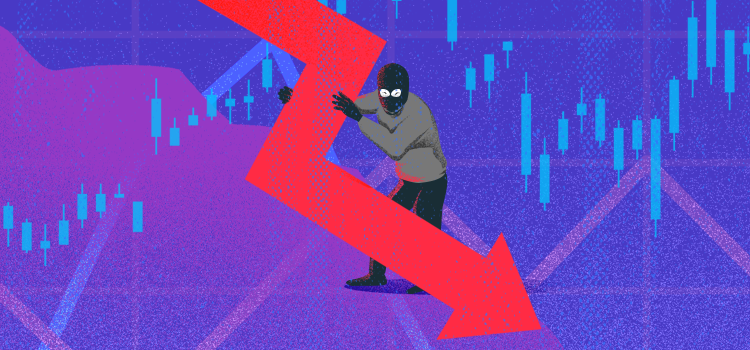September 29, 2022
Crime Trends During a Recession

Steve Adams
Product Marketing Manager
Following the Covid-19 pandemic and the war in Ukraine, economies are slowing down and the world might very well be on the verge of a recession. One may assume that crime increases during difficult financial periods. However, historical data does not clearly suggest that the socioeconomic effects of a downturn market necessarily lead to increased crime rates.
Analysis of data since 1960 shows that there has been no consistent relationship between periods of economic recession and crime rates and that the two often diverge. This data suggests that while violent crime and property crime rates did increase during some recessions, they either remained relatively stable or decreased during others, suggesting no determinable trend.
When analyzing data, a correlation between variables does not automatically indicate that the change in one variable is the cause of the change in the values of the other variable. In the UK, a recession in the early 1990s coincided with an increase in crime. However, general levels of criminal activity had been rising continually for decades, so this increase may have occurred regardless and may have just been a correlation. The fact that crime increased during some recessions but decreased during others, like in 2008, could suggest that there may not be a causal relationship between crime rates and economic indicators.
However, there are other possibilities. The divergence between crime rates and recessions may be because crime rates are causally related to many other influences beyond economic conditions. Crime rates have been consistently falling in Europe and America for decades, as a result of many factors like improved policing methods, education, and standards of living. It is possible that no single factor would significantly impact overall crime rates. Socioeconomic factors like recessions may have a causal relationship with crime that impact is restrained by other conditions. An example of this could be that as unemployment rises through redundancies, people may consider turning to crime, but opportunities for crime are reduced by more people being at home during the day as they no longer leave for work.
Alternatively, there may be only a causal relationship between recessions and some crime types, such as property crimes, but not others, like murder. Some data suggests there may be some truth to this hypothesis. While the overall crime rate reduced by 4% during the 2008 recession, some crime types did increase. Many UK police forces reported rising instances of robbery, burglary, and motor vehicle theft. During this period, thefts from the person increased by 25% and burglaries increased by 4%.
Facing heightened financial pressures, like increased fuel costs, high inflation, and stagnant wages, more people turn to alternative sources of income. For many, this may be a second job, however, for a small minority, this involves illicit activity. Several studies have suggested a possible causal link between unemployment and crime rates to determine if people turn to crime in times of economic turmoil.
During a recession, people tend to be more financially vulnerable. With rising inflation and the high cost of energy, food, and rent, people reduce household spending and seek ways to increase income or cut costs. In difficult economic times, the capacity for people to rationalize fraud and corruption increases. As potential unemployment looms, criminality may seem like a viable option for an increasing number of everyday people.
Crime types likely to be impacted by a recession are those that offer a financial reward for perpetrators. In the U.S., violent crime, which provides no income, reached a 40-year low in 2010 despite the struggling economy and high unemployment. However, documented recession-related increases in crime include crimes like shoplifting and theft from the person of high-value items like electronics that offer an incentive for perpetrators.
Beyond property-related crimes, one crime frequently reported as impacted significantly by recessions is fraud. During the 1980, 1990, and 2008 recessions, fraud offenses increased between 5% and 10%. Historical data suggests that insurance claims and fraud skyrocket during times of recession. During the 2008-2009 financial crisis, the amount of money lost through fraud in the UK jumped by 20%. This consistent correlation between a fall in economic output and an increase in fraud may be due to a causal link.
During the 2008 recession, undetected fraud is estimated to have risen by 24%. Fraudulent motor claims experienced the most significant growth in both volume and value, with fraudulent claims including staged ‘crash-for-cash’ collisions and inflated claims.
Similarly, during the same 2008 recession, many banks encountered substantial increases in fraud incidents. Known techniques involved fraudsters running up large balances on accounts set up using synthetic or stolen identities and defaulting and organized fraud rings defrauding banking institutions at scale. During the global economic boom that preceded the 2008 crash, there was a significant opportunity for fraud and corruption. During the recession, when finance providers retrenched and sought a return on loans and investments, fraudulent borrowing and investments, such as the Madoff Ponzi scheme, may have simply been revealed.
Landlords have also experienced increased fraud during recessions, with raised labels of prospective tenants presenting fraudulent referencing documents like bank statements and references. Rent-related frauds can be low-level, like doctoring statements to hide previous lack of payment or limited funds to secure rental properties under false pretenses. Rent-related frauds can also be high-level, like organized criminals falsifying documents using software and tools to rent properties from abroad and lease them out as part of scams.
During the Covid-19 pandemic, amid the cost of living crises, fraudulent insurance claims surged by at least 13%, despite falling by 10% in 2020. Zurich reported that insurance fraudsters claimed an average of £8,800 by illicitly claiming for ‘damaged’ or ‘stolen’ jewelry, mobile phones, and TVs. The insurer suggested that there had been a “significant rise” in fraudulent claims as households came under increased financial strain because of the pandemic.
Significantly increased levels of inflation, energy bills, and taxation possibly influenced everyday people to criminality to account for the real-world loss of income with stagnant wages. During recessions, increased levels of insured parties risk criminal prosecution, imprisonment, and, at the very least, difficulty obtaining future coverage.
Insurer LV reported fraudulent insurance claims more than doubled in the last three months of 2021. During this period, “pre-inception losses”, where an insuree takes out a policy on an item damaged or lost before coverage and lies about dates, increased by as much as 156% compared to the previous quarter.
Another significant risk to insurance carriers during a recession is internal threats within an organization. The Fraud Triangle, developed by Dr. Donald Cressey, describes three conditions required for fraud to occur. The perpetrators must experience an ‘Incentive/Pressure’ and an ‘Opportunity’ to commit fraud and be able to ‘Rationalise/Justify’ their actions. A recession can lead employees to meet these criteria.
Encountering economic pressures can lead employees to radically re-consider loyalties and rationalize behavior they would not normally consider appropriate. Facing such financial hardship alongside threats of redundancy can lead to employees becoming disgruntled. Dissatisfaction is compounded for those that survive employee cuts, as those remaining are responsible for picking up the slack and taking on more workload. During this time, employees may be increasingly motivated to defraud or steal from their employer. As the employer claims on their insurance for any damage or loss, insurers will be significantly impacted by the chain of events created by a recession.
Insurers that are financially impacted by an economic slowdown may also look to reduce their workforce. During downsizing, middle management is often heavily affected. If cuts impact claims handlers and investigators, then an insurance carrier's ability to detect fraudulent activity can diminish as a result of a reduced first line of defense.
As the economy continues to stumble, insurance carriers must be prepared for a sharp increase in fraud and ensure they have formulated a methodical approach to fraud prevention that leverages all the information available, including internet intelligence. With the increase in fraudulent claims predicted to continue, insurers should consider leveraging automation technology to cope with the level of fraudulent claims and successfully deliver a three-pronged approach based on detection, enforcement, and prevention.

